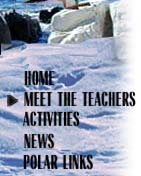
|
|
5 November, 1999
It snowed today. (See picture below) This may not sound like a big deal but
considering that this is the driest of all continents, the snow today
surprised me. It was moderately heavy snow with large flakes. In fact, I
have already seen more snow since I have been here than I expected to see.
Maybe Antarctica isn't as dry as I thought. I decided to compare the
precipitation in McMurdo to my hometown, Appleton, Wisconsin. If you compare
the snowfall charts for McMurdo and Appleton, in the upper Midwest of the
United States, Appleton gets less snow over the course of the year (Although
Appleton has snowier months in the winter). However, in terms on total water
equivalent (i.e. the amount of water that falls in the form of snow, ice or
rain) it is much different. Appleton gets about 31 inches of precipitation
each year and McMurdo only gets 7.5 inches of precipitation a year.
Remember, McMurdo get virtually all of its precipitation in the form of
snow. The average total water equivalent for the continent is less then 5
inches. Most of the precipitation that does fall is on the continental
margins. The average water equivalent of precipitation on the polar plateau
is less than 2 inches! So, yes Antarctic is very dry.
The reason there is so little precipitation is that the air in Antarctica is
very dry. The Antarctic atmosphere, because of its low temperature, contains
only about one-tenth the water vapor concentration found in temperate
latitudes. What moisture that does enter the atmosphere largely comes from
ice-free regions of the southern oceans and is transported in the
troposphere into Antarctica. The snow we had today was due to a storm
bringing moisture off the open water ot the seas near McMurdo.
Snowstorms are not the most feared storms in Antarctica. That honor is
reserved for the "herbie" Herbies are the most powerful and dangerous storms
on this part of Ross Island. They come out of the South bringing winds that
can be in excess of 100 knots These winds can cause blowing snow that makes
visibility go to zero and wind-chills to dangerous and even life-threatening
levels. A herbie can hit an area very quickly and trap unaware Antarctic
travelers. A moderate herbie hit Mactown today. It has caused Condition One
and Condition Two levels in this area. Travel is restricted. No flights came
in or out of McMurdo today. As I sit now in Crary Lab typing this journal, I
can hear the wind howling and outside the window I can only see about 100
yards. It will be a very interesting walk back to the dorm.
Special Note: I will be starting an evaporation experiment on Monday. For
those of you from schools I have visited, you should have a copy of the
experiment in your packet. It's called "Going, Going, Gone!". I will set up
the experiment on Monday morning (Central Time in the US) and I will post my
initial data and keep you posted on results. You can compare my results with
yours. If you would like a copy of the experiment, e-mail me. I will send
you a Microsoft Word file with the experiment. Remember that I will start it
Monday.
Featured CRP Team Members: These are the paleomagnetists (or as they are
sometimes called, paleo-magicians). They determine the strength and
orientation of the magnetism in the minerals in the core samples. From this
information they can help determine the age of the rock and the environment
which they were deposited. The CRP team members pictured below are Fabio
Florindo from Rome, Italy, Adam Harris from Davis, California and Gary
Wilson from Oxford, England.
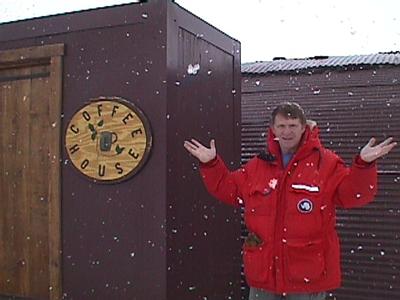
It's snowing!!!!
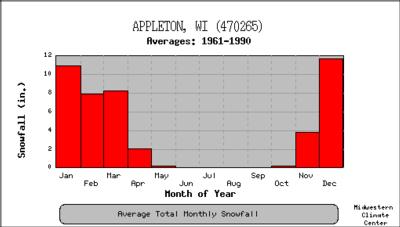
Snowfall for Appleton, Wisconsin
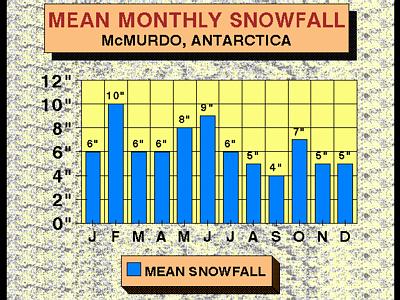
Snowfall for McMurdo Station, Antarctica
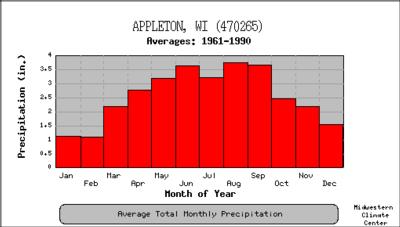
Total Precipitation for Appleton, Wisconsin
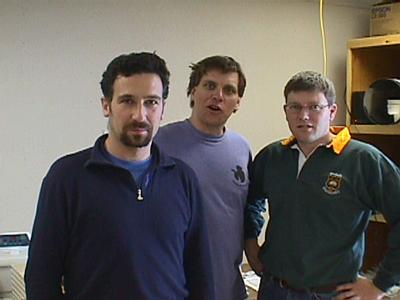
From left to right: Fabio Florindo, Adam Harris, and Gary Wilson. The paleo-magicians!
Contact the TEA in the field at
.
If you cannot connect through your browser, copy the
TEA's e-mail address in the "To:" line of
your favorite e-mail package.
|
